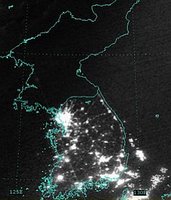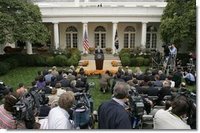It's Not So Much about Who Kim Is,
. . .as it's about who George Bush is.
 My gut reaction with Kim Jong Il is that he is a totally fooked up totalitarian bastard for whom it's difficult not to add the attribution of EVIL. But what other appellation is more accurate? For someone who purposely/purposelessly starves masses of his own people? But's that just my personal -- very personal -- distaste for Kim. Were I a political decision-maker in the political hierarchy or bureaucracy of a nation-state, I would be irresponsible to allow my personal feelings to affect my policies.
My gut reaction with Kim Jong Il is that he is a totally fooked up totalitarian bastard for whom it's difficult not to add the attribution of EVIL. But what other appellation is more accurate? For someone who purposely/purposelessly starves masses of his own people? But's that just my personal -- very personal -- distaste for Kim. Were I a political decision-maker in the political hierarchy or bureaucracy of a nation-state, I would be irresponsible to allow my personal feelings to affect my policies.Studies of strategic options completed during the Clinton administration concluded that any military strike against the North would court massive retaliation causing enough unbelievable devastation of the most populated areas of South Korea that they were unthinkable. I don't think the parameters have changed in six years, unless they've become even more adverse.
 No one likes extortion. On the international (inter-nation) level it is especially unpalatable. But that's the apparent strategic concept of the Pyongyang government: use starvation as a means of suppression, and use nuclear blackmail to force the international community to prop up the resulting unsustainable economy.
No one likes extortion. On the international (inter-nation) level it is especially unpalatable. But that's the apparent strategic concept of the Pyongyang government: use starvation as a means of suppression, and use nuclear blackmail to force the international community to prop up the resulting unsustainable economy. Again, trying mightily to hold my personal disgust of Kim in check, with the military option off the table, I might entertain anything from an embargo to a total of blockade of North Korea. Greater starvation condensed into a short term might be morally defensible if it promised eventual regime change in the near or intermediate term. Furthermore, mass suffering starvation wouldn't be augmented by bunker-busting, dumb-bombing, would it? However, who's to say what level of provocation will tip Kim Jong Il into launching an assault on South Korea with his conventional artillery-tipped million-man army? Even mild economic sanctions might not be all that promising, either, huh?
Again, trying mightily to hold my personal disgust of Kim in check, with the military option off the table, I might entertain anything from an embargo to a total of blockade of North Korea. Greater starvation condensed into a short term might be morally defensible if it promised eventual regime change in the near or intermediate term. Furthermore, mass suffering starvation wouldn't be augmented by bunker-busting, dumb-bombing, would it? However, who's to say what level of provocation will tip Kim Jong Il into launching an assault on South Korea with his conventional artillery-tipped million-man army? Even mild economic sanctions might not be all that promising, either, huh?Anatol Lieven and John Hulsman suggest that North Korea Isn't (Really) Our Problem. They say The U.S., overstretched already, should treat Kim Jong Il as a regional crisis and let China take the lead:
The United States is bogged down in what appears to be an unwinnable war in Iraq; it is facing very unpleasant options in regard to neighboring Iran's nuclear program; senior NATO officers say that the situation in Afghanistan is deteriorating fast; in the former Soviet Union, Georgia and Russia are moving toward military confrontation, with the U.S. seemingly unable to restrain either; in large swaths of Latin America, new nationalist and populist movements are challenging U.S. interests.Translation: The United States is no longer the unchallenged world superpower it was in 2000. Squandering its vast economic, diplomatic, moral and military assets in Iraq -- an un-provoked, unnecessary, largely unilateral invasion and unplanned occupation of Iraq (UULUIUOI) -- our once great country is now a second-rate power. With our military efforts in Afghanistan (that one forced upon us) and Iraq eroding under our brave soldiers' boots, this administration and its Pentagon cannot credibly claim it can fight two (or more) wars anywhere in the world. We will have to concede this and perhaps other crises to other world powers, like China.
And now the totalitarian regime in North Korea has defied the international community by testing a nuclear bomb — and the U.S. appears to have neither military nor effective economic measures with which to respond.
If all this does not prove the reality of American overreach, what does? If U.S. power is to be placed on a firmer basis, its exercise must be more limited. Certain commitments will have to be scaled back or even eliminated if the U.S. is to be able to concentrate on dealing with its most truly vital challenges and enemies.
. . . . North Korea must be treated as a regional problem to be managed by a regional concert of powers, with China in the lead. The U.S. role in all this should be sympathetic — and distant.
My fellow Americans will struggle, as I have, with accepting this fate. Their reckoning will be delayed by the pretenses of our misleaders, (Bush, Cheney, Rumsfeld) who are still living in the pre-UULUIUOI world: They have drawn their lines in the sands (repeatedly) against two members of their Axis of Evil, Iran and North Korea: cross this line (or that line) of proliferation, they have said, and there will be consequences, because this or that is not to be tolerated. Only, when these lines are crossed, there are no consequences, but only more veiled (unspecified) threats: "all options are on the table." This unrealistic level of grandiosity is what LTE referred to when he blurted out, De Nile is a tributary of de Potomac. That America is now second-rate power is a secret kept only from Bush and his administration. It is fully transparent to the rest of the world.
By way of example, take a short peek at what went down during Bush's press conference today:
 QUESTION (Mike):
QUESTION (Mike):You said yesterday in your statement that the North Korean nuclear test was unacceptable. Your chief negotiator for the six-party talks said last week that North Korea has a choice of either having weapons or having a future. When you spoke a month or so ago to the American Legion, you talked about Iran and said, there must be consequences for Iran's defiance, and we must not allow Iran to develop a nuclear weapon. I am wondering, sir, your administration has issued these kinds of warnings pretty regularly over the last five years, and yet these countries have pursued their nuclear programs. I'm wondering if you -- what is different about the current set of warnings, and do you think the administration and our government runs a risk of looking feckless to the world by issuing these kinds of warnings regularly without response from the countries?
 THE PRESIDENT:
THE PRESIDENT:That's a fair question. First of all, I am making it clear our policy hasn't changed. It's important for the folks to understand that we don't continually shift our goals based upon polls or -- whatever.And so on. The transparency of our America's decline is clear to all when the word Feckless is pronounced in a Presidential press conference with impunity:
See, I think clarity of purpose is very important to rally a diplomatic effort to solve the problem. And so I try to speak as clearly as I can and make sure there's no ambiguity in our position. I also found that's a pretty good way to help rally a diplomatic effort that I believe will more likely work.
I know this sounds -- I'm just saying it over and over again, but it's -- rhetoric and actions are all aimed at convincing others that they have an equal stake in whether or not these nations have a nuclear weapon, because I firmly believe, Mike, that - that is the best strategy to solve the problem. One has a stronger hand when there's more people playing your same cards. It is must easier for a nation to hear what I believe are legitimate demands if there's more than one voice speaking. And that's why we're doing what we're doing.
And to answer your question as to whether or not the words will be empty, I would suggest that, quite the contrary, that we not only have spoken about the goals, but as a result of working together with our friends, Iran and North Korea are looking at a different -- a different diplomatic scenario.
. . . . And my answer is that I believe the Commander-in-Chief must try all diplomatic measures before we commit our military. And I believe the diplomacy is -- we're making progress when we've got others at the table. . . .
feck-less /'f'kl's/ Pronunciation Key - Show Spelled Pronunciation[fek-lis] Pronunciation Key - Show IPA PronunciationThe reason why shitcan tyrants like Kim Jong Il and Omar al-Bashir are giving us the middle finger salute with impunity is that America has become a second-rate power. Only our president doesn't know this because no one in his entourage of handlers will tell him.
–adjectivefeck·less (fkls) Pronunciation Key Audio pronunciation of "Feckless" [P]
- ineffective; incompetent; futile: feckless attempts to repair the plumbing.
- having no sense of responsibility; indifferent; lazy.
adj.
- Lacking purpose or vitality; feeble or ineffective.
- Careless and irresponsible.


4 Comments:
Thanks, Indicted Plagiarist, for providing this space!
Not a very desirable outcome will derive from leaving it up to the Chinese: their concerns are not our concerns. To the West, including the U.S.A., ROK, and Japan, the danger is nuclear extortion: "give us what we want or we'll go off on you and in a very dirty way".
The Chinese are worried that the DPRK will implode economically, flooding their country with refugees. That is why China opposes economic sanctions.
The West would prefer implosions to explosions.
But your point is well-taken: too bad America has lost so much influence in THREE years. Too bad we don't have gifted and reliable leadership.
Jimmy Carter examines two options in his Solving the Korean Stalemate, One Step at a Time
One option, the most likely one, is to try to force Pyongyang's leaders to abandon their nuclear program with military threats and a further tightening of the embargoes, increasing the suffering of its already starving people. Two important facts must be faced: Kim Jong-il and his military leaders have proven themselves almost impervious to outside pressure, and both China and South Korea have shown that they are reluctant to destabilize the regime. This approach is also more likely to stimulate further nuclear weapons activity.
The other option is to make an effort to put into effect the September denuclearization agreement, which the North Koreans still maintain is feasible. The simple framework for a step-by-step agreement exists, with the United States giving a firm and direct statement of no hostile intent, and moving toward normal relations if North Korea forgoes any further nuclear weapons program and remains at peace with its neighbors. Each element would have to be confirmed by mutual actions combined with unimpeded international inspections.
Although a small nuclear test is a far cry from even a crude deliverable bomb, this second option has become even more difficult now, but it is unlikely that the North Koreans will back down unless the United States meets this basic demand. Washington's pledge of no direct talks could be finessed through secret discussions with a trusted emissary like former Secretary of State Jim Baker, who earlier this week said, "It's not appeasement to talk to your enemies."
What must be avoided is to leave a beleaguered nuclear nation convinced that it is permanently excluded from the international community, its existence threatened, its people suffering horrible deprivation and its hard-liners in total control of military and political policy.
One has a stronger hand when there's more people playing your same cards.
Post a Comment
<< Home